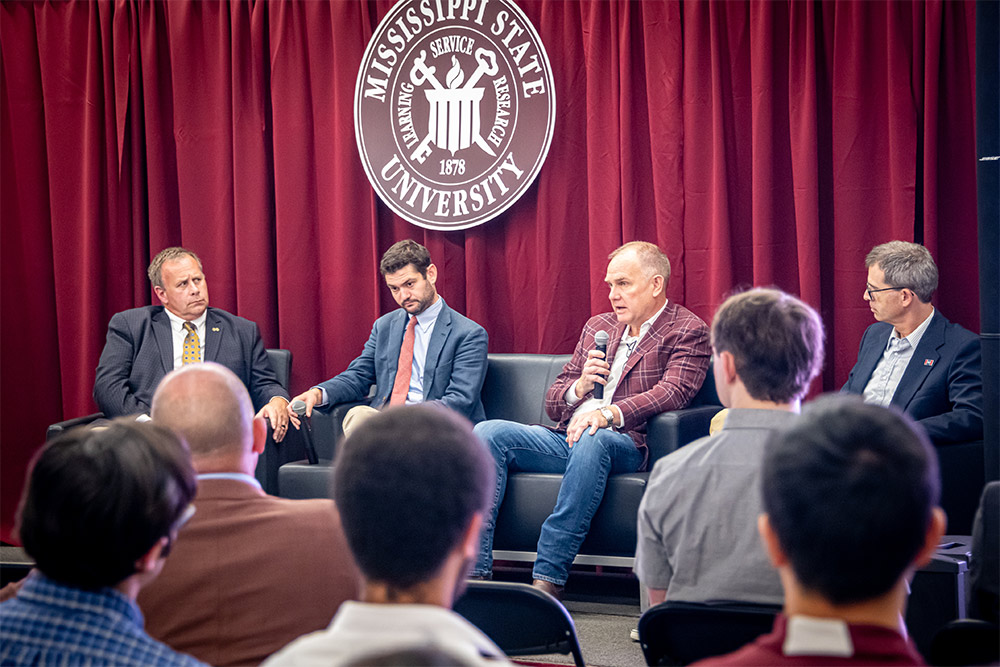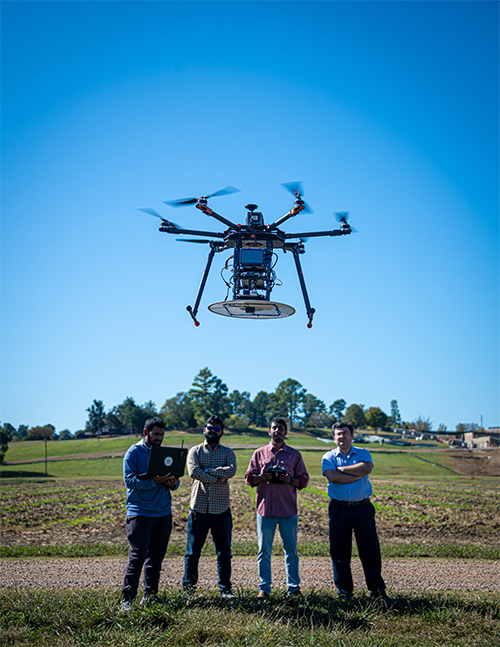MSU officially opens nation’s first Agricultural Autonomy Institute
MSU officially opens nation's first Agricultural Autonomy Institute Mississippi State University


Contact:
Mississippi State University Opens Agricultural Autonomy Institute

The Agricultural Autonomy Institute, the nation’s first and only interdisciplinary research center focused on autonomous technologies to enhance on-farm precision and efficiency, was officially opened at Mississippi State University on October 26. This institute builds on and expands MSU’s longstanding precision agriculture efforts and history of innovation in the field. It serves as a hub for researchers across campus interested in technologies such as robotics, artificial intelligence, and remote sensing that have the potential to increase agricultural precision, production, and profitability.
Autonomous Technologies for Increased Efficiency
Alex Thomasson, the director of the Agricultural Autonomy Institute and head of MSU’s Department of Agricultural and Biological Engineering, highlighted how autonomous technologies can address labor shortages by making farm workers more efficient with the aid of novel systems. These autonomous systems allow a single farm worker to oversee multiple machines and operations simultaneously, multiplying their productivity. The overall goal of the institute is economic development, attracting agricultural equipment companies and conducting research that leads to technology-based startup companies. Additionally, the institute aims to develop a new workforce with skills in robotics, mechatronics, and computer coding, positioning Mississippi as a leader in agricultural autonomy.

Research Infrastructure and Collaboration
The research infrastructure for the institute includes a 4,800-square-foot laboratory space in the Pace Seed Technology Laboratory and a five-acre “Autonomous Acres” proving ground at MSU’s R.R. Foil Plant Science Research Center. The institute is jointly managed by the university’s Office of Research and Economic Development and the Division of Agriculture, Forestry, and Veterinary Medicine, with support from the Bagley College of Engineering, the College of Agriculture and Life Sciences, the Mississippi Agricultural and Forestry Experiment Station, and other MSU institutes, research centers, and departments.
Julie Jordan, MSU’s vice president for research and economic development, highlighted the collaborative and interdisciplinary culture of research at the university. She emphasized that the centers and institutes at MSU are designed to bring people and disciplines together to solve problems, accelerating the translation of research into real-world solutions.
Leading in Agricultural Research
For decades, Mississippi State University has been recognized as a top university for agricultural research and development expenditures. In the most recent rankings by the National Science Foundation, MSU is ranked No. 11 nationally. Keith Coble, vice president for the Division of Agriculture, Forestry, and Veterinary Medicine, emphasized the need for continuous evolution and modernization in agricultural research to maintain leadership in the face of global competition. Coble highlighted the institute as a crucial step in maintaining MSU’s leadership in agricultural innovation.
Examples of Agricultural Autonomy Research
MSU’s agricultural autonomy research efforts include projects such as using robots to harvest crops like cotton and studying how cows respond to robotic herders. These interdisciplinary projects have been developed by a team of approximately 40 researchers across campus who established an agricultural autonomy working group in the years leading up to the institute’s launch.
Mississippi State University is committed to achieving the Sustainable Development Goals (SDGs) through its research and innovation. Learn more at www.msstate.edu.
SDGs, Targets, and Indicators
-
SDG 8: Decent Work and Economic Growth
- Target 8.2: Achieve higher levels of economic productivity through diversification, technological upgrading, and innovation
- Indicator 8.2.1: Annual growth rate of real GDP per employed person
- Indicator 8.2.2: Proportion of youth not in education, employment, or training
The article mentions that the goal of the Agricultural Autonomy Institute is economic development and attracting agricultural equipment companies. By utilizing autonomous technologies, the institute aims to increase agricultural precision, production, and profitability, which aligns with the target of achieving higher levels of economic productivity through technological upgrading and innovation. The indicators mentioned in the article are not directly related to the targets discussed.
-
SDG 9: Industry, Innovation, and Infrastructure
- Target 9.5: Enhance scientific research, upgrade the technological capabilities of industrial sectors in all countries
- Indicator 9.5.1: Research and development expenditure as a proportion of GDP
The establishment of the Agricultural Autonomy Institute demonstrates MSU’s commitment to enhancing scientific research and upgrading technological capabilities in the agricultural sector. This aligns with the target of enhancing scientific research and technological capabilities in all countries. The indicator mentioned in the article is not directly related to the target discussed.
-
SDG 12: Responsible Consumption and Production
- Target 12.2: By 2030, achieve the sustainable management and efficient use of natural resources
- Indicator 12.2.1: Material footprint, material footprint per capita, and material footprint per GDP
The use of autonomous technologies in agriculture can contribute to the sustainable management and efficient use of natural resources, as mentioned in the article. This aligns with the target of achieving sustainable management and efficient use of natural resources. The indicator mentioned in the article is not directly related to the target discussed.
Table: SDGs, Targets, and Indicators
| SDGs | Targets | Indicators |
|---|---|---|
| SDG 8: Decent Work and Economic Growth | Target 8.2: Achieve higher levels of economic productivity through diversification, technological upgrading, and innovation | – |
| – | – | – |
| SDG 9: Industry, Innovation, and Infrastructure | Target 9.5: Enhance scientific research, upgrade the technological capabilities of industrial sectors in all countries | – |
| – | – | – |
| SDG 12: Responsible Consumption and Production | Target 12.2: By 2030, achieve the sustainable management and efficient use of natural resources | – |
Behold! This splendid article springs forth from the wellspring of knowledge, shaped by a wondrous proprietary AI technology that delved into a vast ocean of data, illuminating the path towards the Sustainable Development Goals. Remember that all rights are reserved by SDG Investors LLC, empowering us to champion progress together.
Source: msstate.edu

Join us, as fellow seekers of change, on a transformative journey at https://sdgtalks.ai/welcome, where you can become a member and actively contribute to shaping a brighter future.







